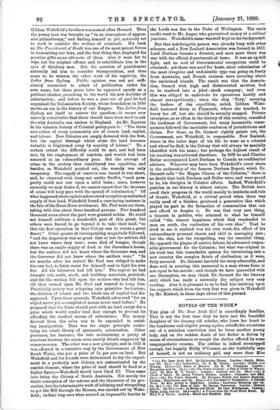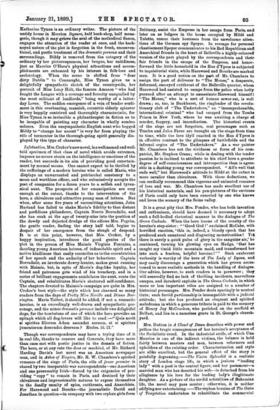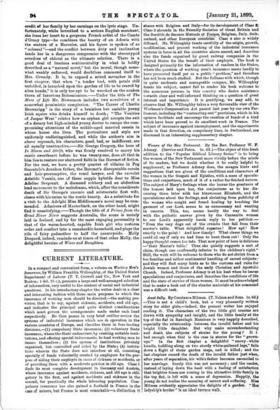NOVELS OF THE WEEK.* THE plan of The Dear Irish
Girl is exceedingly familiar. This is not the first time that we have met the beautiful daughter of the dreamy old scholar, who loses her heart to the handsome and eligible young squire, rebuffs his attentions out of a mistaken conviction that he loves another young lady, and on the sudden death of her father is driven by stress of circumstances to accept the shelter offered by some unsympathetic cousins. The outline is indeed stereotyped enough, but happily Biddy O'Connor, as she truthfully says of herself, is not an ordinary girl, any more than Miss
• (L) The Dear Irish Girl. By Katharine Tynan. London Smith, Rider, and Co. (6s. —(2.) Infatuation. By B. }L Oroker. London Chatto and Winch's. [Bel —(3.) Ashes of Empire. By It. W. Chambers. London : Macmillan and Co. (64.]—(4.) The Green Cockade : a Tale of Ulster in 'Ninety- eight. By Mrs. M. T. Pander. London : Downey and Co. [6s.)—(5.) A Cloud of Damn. By Annie Victoria Dutton. London : Chapman and Hall. (64.)—(6.) The Vision Splendid. By Florence Bright and Robert Kaohray. London : Hutchinson and Co. 1[6s.)—(7.) The Gates of Temptation : a Natural Novel. By Mrs. Albert S. Bradshaw. London Lawrence Greening and Oa. (Ia. ed.]—(8.) The Mau of Life. By George Newoomen. London : Bellaire and Co. [8•. 6d.1—(9.) In Storm and Strife. By Jean Middleman. Loudon t Dishy, Long, and Co. (68.]—(10.) A Prince from the Great Hever Irever. Mary F. A Tench. London Hurst and Blaokett. Katharine Tynan is an ordinary writer. The picture of the untidy house in Merrion Square, half book-shop, half mena- genie, though it may grieve the soul of the methodical Saxon, engages the attention of the reader at once, and the hack- neyed nature of the plot is forgotten in the fresh, unconven- tional, and poetic treatment of the dramatis persona and their surroundings. Biddy is removed from the category of the ordinary by her picturesqueness, her brogue, her untidiness, just as Maurice O'Hara's physical attractions and accom- plishments are enhanced by his interest in folk-lore and archmology. When the scene is shifted from " dear dirty Dublin " to Connaught, Miss Tynan gives us a delightfully sympathetic sketch of the countryside, her portrait of Miss Lucy Holt, the famous Amazon " who had fought the League with a courage and ferocity unequalled by the most militant of landlords," being worthy of a latter- day Lever. The sudden emergence of a vein of tender senti- ment in this overbearing, mannish, eccentric elderly spinster is very happily contrived and thoroughly characteristic, for Miss Tynan is so invincible a philanthropist in fiction as to be incapable of painting any character in wholly sombre colours. Even the unsympathetic English aunt who begged Biddy to "change her accent" is very far from playing the role of tormentor in the thorough-going spirit generally dis- played by this type of character.
Infatuation, Mrs. Croker's new novel, is awell-named and well- told specimen of that class of novel which avoids extremes, imposes no severe strain on the intelligence or emotions of the reader, but succeeds in its aim of providing good entertain- ment by normal means. One cannot expect to be thrilled by the sufferings of a modern heroine who is called Maria, who displays an unwarranted and patriarchal constancy to a mean and worthless officer, and who submissively accepts the post of companion for a dozen years to a selfish and tyran- nical aunt. The prospects of her emancipation are rosy enough at the outset, thanks to the intervention of the hero, a chivalrous and attractive young man of letters. But when, after some five years of unremitting attentions, John Harland has failed to shake Maria's fidelity to that distant and perfidious philanderer, Captain Norris Borradaile, and she has sunk at the age of twenty-nine into the position of the dowdy and dejected drudge of the odious Mrs. Pegrim, the gentle reader, finding the story half told, begins to despair of her emergence from the slough of despond. It is at this point, however, that Mrs. Croker, by a happy inspiration, introduces the good genius of the plot in the person of Miss Maimie Virginia Fontaine, a dazzling young American heiress, of indomitable spirit and a native kindliness that easily reconciles us to the eccentricities of her speech and the audacity of her behaviour. Captain Borradaile, an inveterate dowry-hunter, makes great running with Maimie, but, in spite of Maria's dog-like loyalty, her friend and patroness gets wind of his treachery, and in a series of brilliant engagements annihilates the aunt, routs the Captain, and rehabilitates Maria's shattered self-confidence. The chapters devoted to Maimie's campaign are quite in Mrs. Croker's best style—the style which has charmed so many readers from the days of Pretty Miss Neville and Diana Bar- rington. Maria Talbot, it should be added, if not a romantic heroine, is an exceedingly well-drawn and sympathetic per- sonage, and the minor dramatis persona. include two delightful doge, for the tombstone of one of which the hero provides an epitaph which all dog-lovers will like to read :—" Quis novit si spiritns filiornm Adam ascendat sursum, at si spirant) jumentorum descendat deorsum ? Eccles. iii. 21."
Though war correspondents may have a trying time of it in real life, thanks to censors and Generals, they have more than once met with poetic justice in the domain of fiction. The hero, or at any rate the dens ex machind, of Mr. Richard Harding Davis's last novel was an American newspaper man, and in Ashes of Empire, Mr. R. W. Chambers's spirited romance of the siege of Paris, the role of jeune premier is shared by two inseparable war correspondents—one American and one presumably Irish—forced by the exigencies of pro- viding " copy " to remain in Paris, and destined by their chivalrous and impressionable natures to expose themselves to the deadly enmity of spies, cutthroats, and Anarchists. For Harewood and Bourke—the journalistic David and Jonathan in question—in company with two orphan girls from
Brittany, assist the Empress in her escape from Paris, and later on as lodgers in the house occupied by Hilde and Yolette, rescue their hostesses from the unwelcome atten-. tions of the German spy Speyer. In revenge for personal chastisement Speyer communicates to his Red Republican and Anarchical friends in the heart of Belleville a highly-coloured version of the part played by the correspondents and their fair friends in the escape of the Empress, and hence- forward the little household in the Rue d'Ypres is subjected to inquisitorial visits, while Harewood and Bourke are marked men. It is a good notion on the part of Mr. Chambers to assign the part of deliverer to " The Mouse," a desperate, deformed, one-eyed cutthroat of the Belleville quarter, whom Harewood had assisted to escape from the police when hotly pursued after an attempt to assassinate Harewood himself I " The Mouse," who is a sort of human sewer-rat, is well drawn ; so, too, is Bnckhurst, the ringleader of the revolu- tionary club of "The Undertakers," an "incomprehensible, international criminal" who had escaped from the Tombs Prison in New York, where he was awaiting a charge of murder, forgery, and incendiarism. The historical events of the siege are not forgotten, real personages such as Troche and Jules Fevre are brought on the stage from time to time, while the love idyll enacted in the Rue d'Ypres is in effective contrast to the glimpses of battlefields and the infernal orgies of "The Undertakers." As a war painter Mr. Chambers has not the vividness or force of his com- patriot, Mr. Stephen Crane; while in dealing with the tender passion he is inclined to attribute to his chief hero a greater degree of self-consciousness and introspection than is agree- able in a dashing young war correspondent. " All's well that ends well," but Harewood's attitude to Hildo at the outset is more cavalier than chivalrous. With these deductions, we can cordially recommend this vigorous and animated romance of love and war. Mr. Chambers has made excellent use of his historical materials, and his pen-pictures of the environs of Paris could only have been executed by one who knows and loves the scenery of the Seine valley.
It is a great pity that Mrs. Pender, who has both invention and enthusiasm, should have deemed it necessary to adopt such a full-bodied rhetorical manner in the dialogue of The Green Cockade. When the hero learns of the cruelty of the heroine's step-sister : "'Good God ! ' exclaimed McCabe, with horrified emotion, 'this is, indeed, a bloody epoch that has produced such unnatural and disgusting monstrosities I Yet there is surely a quick pulse of glory in the sanguine air,' he continued, turning his glowing eyes on Madge, that has caught my timid little mountain maid, and transformed her into such a fearless, helpful heroine ! ' " Snch exuberant verbosity is worthy of the hero of The Lady of Lyons, and may easily discourage a generation which has grown accus- tomed to more realistic methods in the handling of dialogue. Our advice, however, to such readers is to persevere ; they will assuredly find no lack of thrilling incidents, marvellous escapes, and daredevil exploits in The Green Cockade, in which more or less important roles are assigned to a number of historical personages. Mrs. Pender deals sparingly in neutral tints; such fervid partisanship is incompatible with a judicial attitude; but she has produced an eloquent and spirited melodrama in which a generous tribute is paid to the memory of Henry Joy McCracken, who perished on the scaffold at Belfast, and lies in a nameless grave in St. George's church- yard.
Mrs. Dutton in A Cloud of Dawn describes with power and pathos the tragic consequences of her heroine's acceptance of the Socialistic creed. In the industrial strife, of which Una Maurice is one of the indirect victims, the balance is held fairly between masters and men, between reformers and upholders of the existing order. Characterisation and style are alike excellent, but the general effect of the story is painfully depressing.—The Vision Splendid is a realistic story of London stage life, in which a jealous "leading lady" with a past is the central figure, and her paramour—a married man who has deserted his wife—is detached from his allegiance by his love for the leading lady's illegitimate daughter. As a picture of the sordid actualities of Bohemian life, the novel may pass muster ; otherwise, it is neither edifying nor entertaining.—The orphan heroine of The Gates of Temptation undertakes to rehabilitate the commercial credit of her family by her earnings on the lyric stage. Un- fortunately, while betrothed to a serious English merchant, she loses her heart to a gorgeous French artist of the Comte d'Orsay type—he combines the beauty of an Adonis with the stature of a Hercules, and his figure is spoken of as "colossal "—and the conflict between duty and inclination lands her in a dangerous compromise with the stereotyped overdose of chloral as the ultimate solution. There is a good deal of luscious sentimentality in what is boldly described as a "natural novel," but the moral, though some- what weakly enforced, would doubtless commend itself to Mrs. Grundy. It is, to expand a mixed metaphor in the first chapter, that when " a tender bud, with petals still unfolded, is launched upon the garden of life to be reared by alien hands," it is only too apt to be wrecked on the sunken thorn of luxurious Bohemianism.—Under the title of The Maze of Life Mr. Newcomen includes two novelettes of a somewhat pessimistic complexion. "The Career of Charlie Brownrigg" is the story of a brainless but amiable young Irish squire who drinks himself to death ; " The Vanities of Jaspar West" relates how an orphan girl accepts the suit of a dreary but high-minded young doctor to escape the com- promising attentions of the middle-aged married cousin in whose house she lives. The portraiture and style are uniformly undistinguished, and while the author's aim is above reproach, his characters, good, bad, or indifferent, are all equally unattractive.—Sir George Gregory, the hero of In Storm and Strife, who was firmly resolved to marry his rustic sweetheart before he was twenty-one, does all that in him lies to restore our shattered faith in the Baronet of fiction. For the rest, we have a pretty quartet of villains in Peg Scarsdale's drunken father, the Baronet's disreputable cousin and heir-presumptive, the venal lawyer, and the ex-valet Aristide Vannix, one of those supple hybrids dear to Miss Adeline Sergeant. A diamond robbery and an abduction lend movement to the melodrama, which, after the considerate death of Sir George's anmmic and aristocratic first wife, closes with his union to the rustic beauty. As a substitute for a visit to the Adelphi Miss Middlemass's novel may be com- mended. Admirers of Maeterlinck, on the other hand, might find it unsatisfying.—Thongh the title of A Prince from the Great Never Never suggests Australia, the scene is mainly laid in Ireland, and by far the most engaging personality is that of the warm-hearted, capable Irish girl who restores order and comfort into a ramshackle household, and plays the role of fairy godmother to half the countryside. Molly Deepard, indeed, reminds us at times of that other Molly, the delightful heroine of Wives and Daughters.




































 Previous page
Previous page